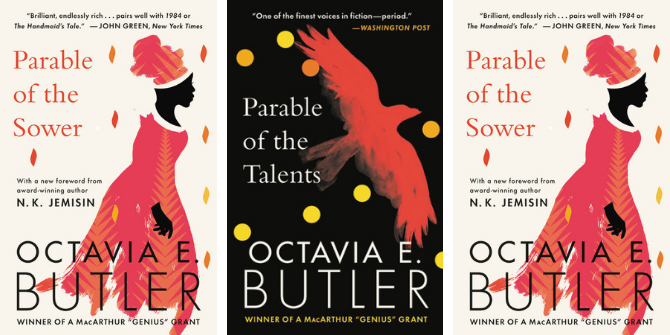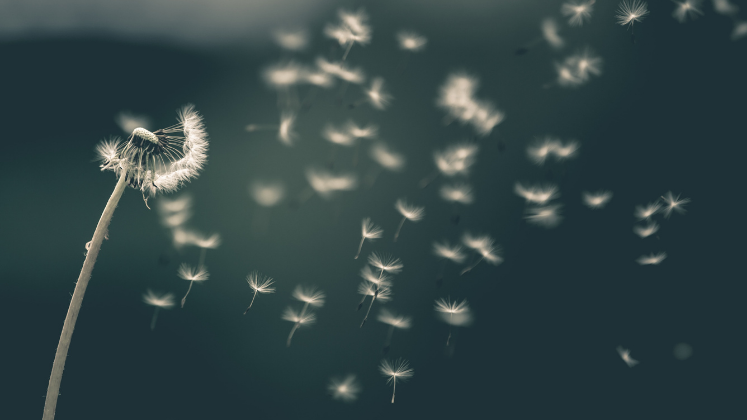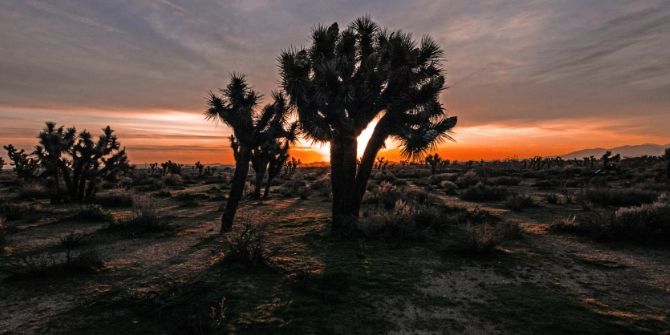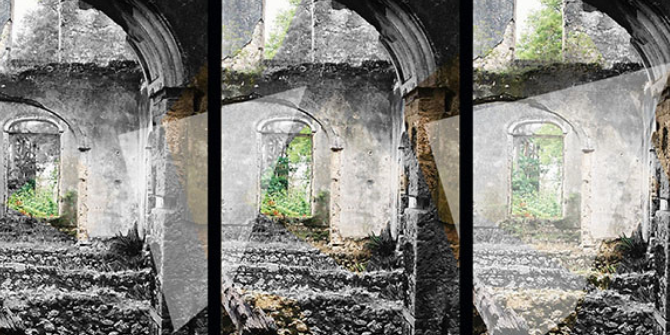Rémy-Paulin Twahirwa explores the sociological relevance of science fiction author Octavia E. Butler’s Parables series of novels, published between 1993 and 1998, reflecting on what these stories can teach us about our species, its (un)dying past and its (un)living future.
On the Destiny of our Species: Reading Octavia E. Butler’s Parables Series
We have lived before.
We will live again.
We will be silk,
Stone,
Mind,
Star.
We will be scattered,
Gathered,
Molded,
Probed.
We will live
And we will serve life.
We will shape God
And God will shape us
Again,
Always Again,
Forevermore.
From EARTHSEED : THE BOOKS OF LIVING (as cited in The Parable of the Talents)
In 1984, when Octavia E. Butler received her first Hugo Award, she was the first author to write science fiction from her experience as an African-American woman — what she called ‘to write myself in [the story]’ in an interview with The New York Times. Indeed, the California-born author’s published works explore themes related to the African-American experience, such as the afterlives of slavery, racism, segregation, colonialism and eugenics in the US. However, Butler was not interested in being a Black writer, but rather a writer writing stories about all people, as she explained in a 2000 interview with Charlie Rose. In any case, Butler’s books are read today not only in light of the identity politics that divide the United States, but also issues of climate change, nuclear war and human and animal genetic engineering.
In this post I focus on Butler’s Parables series of novels (The Parable of the Sower and The Parable of the Talents (1993-98)), briefly summarising the series before examining its sociological relevance today. To this end, I borrow the concept of brutalism from Achille Mbembe (2020) and autopoiesis from Sylvia Wynter (1990). It is not only a matter of interpreting the series in the light of the ‘living-system’ in which we — as biological and storytelling beings — live and die (Katherine McKittrick 2021, 2, 9), but also of appreciating as much as possible what it allows, as a sociological fiction artefact, to teach us about our species, its (un)dying past and its (un)living future.
A Song of the (Un)Dying and the (Un)Living Future of our Species
Published five years apart, The Parable of the Sower (1993) and The Parable of the Talents (1998) tell the story of Lauren Oya Olimana, a young Black woman living in the US of the year 2024 beset by climate change, exacerbated capitalism, endemic extreme poverty, religious fanaticism and failed state institutions. The community in which Lauren resides, Robeldo, is located not far from today’s Las Vegas. Like other gated settlements scattered across the country, Robeldo is protected by a wall from a mass of homeless people, drug addicts, sex slaves, beggars and bandits who turn to murder, torture and human trafficking to survive. Because of their wall and the weapons at their disposal for defending themselves, the inhabitants of Robeldo manage to live an existence that could qualify as comfortable from the standpoint of those outside.

Lauren is ill-suited to this world where violence and cruelty are the norm as she suffers from a medical condition called ‘hyper-empathy’ (or ‘sharing’) that allows her to feel the feelings, mostly pain but also pleasure, of others when she witnesses them. Like other ‘sharers’, Lauren lives in fear that her condition will be discovered by those who may exploit this weakness for their own interests. For example, sharers are so sensitive to the suffering of others that they may bleed at the sight of a wound on another human. This is why only a few people in Lauren’s life know about her condition. Throughout her journey she will make sure to hide her suffering whilst trying to stay alive.
In this dystopian future, the only thriving American communities are those protected by large private corporations who offer their inhabitants protection with heavy security services and fortifications. In fact — and this is where Butler’s analysis of racial capitalism is most striking — company towns offer protection to their citizens (mostly poor and disenfranchised people of colour) only if they accept work for a wage so low that they become severely indebted, making it near impossible for them to leave. Furthermore, people who are caught by human traffickers are generally put into slavery through an electric collar (‘slave collar’) that delivers jolts of pain and delicious pleasure, making the slaves more manageable through this system of punishment and reward: ‘A collar, my brother was saying, makes you turn against your kind, against your freedom, against yourself’ (Butler 2019, 126).
Lauren’s father, a preacher and teacher, plays the role of leader of Robeldo. He warns his neighbours of the danger of this new form of slavery and believes that the only solution is to ensure the security of their community with the help of guns and walls. Witnessing the destruction of more and more neighbouring towns and villages, Lauren believes that this strategy will not last and that it is imperative to prepare for a future outside, not only of Robeldo, but of the planet.
As a young teenager in the first book, Lauren keeps a journal in which she shares her thoughts on a religion she wants to create that will allow humans to be united in a collective destiny: Earthseed. Later on, it is explained that the Books of the Living, quoted throughout the story as part of Lauren’s diary in The Parable of the Sower and later as part of her teaching in The Parable of the Talents, are excerpts from the religious text of Earthseed.
Earthseed is the dawning adulthood of the human species. It offers the only true immortality. It enables the seeds of the Earth to become the seeds of new life, new communities on new earths. The Destiny of Earthseed is to take root among the stars, and there, again, to grow, to learn, and to fly. (Butler 2019, 311)
The second book recounts the hardships of this first Earthseed community — a hamlet called Acorn founded by Lauren and her followers in northern California — between the 2030s and 2040s. It also introduces new voices, including Lauren’s daughter Larkin, who acts as the novel’s new narrator as she recounts her parents’ lives in Acorn through excerpts from their journals. The Parable of the Talents reveals an America that is gradually recovering from the 2020s. Indeed, the arrival of President Andrew Jarret — who promises to ‘Make America Great Again’ — formalises the takeover of power by the religious fundamentalist Christian America party and its Church led by Jarret. With the help of its armed wing, Jarret’s Crusaders, Christian America suppresses non-Christian cults such as Earthseed and embarks on witch hunts against all those who corrupt America’s soul.
Throughout the second book, Butler describes a nostalgic America obsessed with a ‘greatness’ it has lost. For the wealthy, hidden behind large walled and protected neighbourhoods, escapism takes the form of virtual reality. For the less fortunate, the religious nationalism of Christian America is the only fiction they can afford by enlisting to serve in a war against Alaska, which has become the first state to leave the Union. Although we have only a fragmentary view of this war between Jarret’s US and Alaska (the latter supported by Canada), it is particularly interesting to see the diplomatic relations that the US has with its neighbours. Canada and Alaska become a refuge for many Americans during what looks like the fall of the US Empire. For Lauren and her followers, however, the US and Jarret are not the problem as the dying of this Earth seems impossible to stop. It is, in fact, exile beyond our planet and a refuge among the stars that seem to be the only Destiny for our species.
Taking Root Among the Stars
There is no story that is not true (Chinua Achebe, 2006)
The Parables series offers a creative look at the future of our species by situating it not on our planet, but in the exile and rooting of humanity among the stars. Butler’s audacity here is twofold. Firstly, she outlines the role that religion could play in the preservation of our species, if not of our planet. Thus, when reading the excerpts from the Books of the Living, one can only appreciate Lauren’s efforts to propagate Earthseed. It quickly becomes apparent that a religion such as Earthseed would allow us to overcome the divisions (ethnic, racial, class, etc) that divide our world by uniting us around a sociogenic project: the establishment of our species on other habitable worlds.
This is not to say that Butler is blind to the dangers of religious fanaticism, especially considering the brutal crimes committed by the militia of the Church of Christian America against the first Earthseed community. However what Butler is interested in is how human beings — especially in times of crisis where choices are possible but concealed by what I call the ‘master-script’, or the dominant narrative of the living-system — need a story that will give them long-term purpose that is ‘complex enough’ to transcend their own individuality and bond them as a species. If the God of Abraham is dead as philosopher Friedrich Nietzsche stated, then nothing prevents humanity from ‘shaping’ a new one for its survival and prosperity as a species. One can rightfully disagree with this endeavour, but what the Parables series sheds light on is the power of the ‘people’s opium’ to nurture a hopeful future that is not in some heavenly, obscure world, but in the material and known universe in which we live and die.

Image Credit: Photo by Saad Chaudhry on Unsplash
That said, Butler’s reflection in her series is silent on one crucial point: do religion and our exile among the stars not constitute a form of escapism? Butler’s argument is that our living-system is limiting and limited and that our survival rests on our capacity to cast away old ways of thinking and being in order to evolve and survive. In fact, as storytelling and biological beings, our species is determined by stories — see Wynter and McKittrick’s discussion on mythoi and bios — and religion offers essentially stories about who we were, are, will be and/or want to be as a species. In short, it is not that humanity should create a religion to escape its duties toward this planet and its inhabitants; rather, that shaping our future may not rest on rationality and technology, but on lyricism, creativity and imagination.
Similarly audacious is Butler’s presentation of the God of Earthseed as a god of change who calls for a conscious acceptance of the unknown, adaptation and the resilience that will undeniably accompany any disruption to the present living-system. Here, Wynter’s concept of ‘autopoiesis’ (1990) can act as a key to the Parables series as a whole. Borrowing the term from biologists Humberto Maturana and Francisco Varela, autopoiesis refers to the normative mode of being for a living-system (such as a cell) to reproduce itself, or at least to generate the conditions that ensure its sustainability (McKittrick 2021, 2). In the social world, this may be the sociopolitical, cultural and economic terms that constitute what we could call white supremacist, heteronormative, patriarchal, capitalist, ableist and speciesist ways of living and thinking:
‘That’s what Earthseed was about,’ I said. ‘I wanted us to understand what we could be, what we could do, I wanted to give us a focus, a goal, something big enough, complex enough, difficult enough, and in the end, radical enough to make us become more than we ever have been […] We go on having stupid wars that we justify and get passionate about, but in the end, all they do is kill huge numbers of people, maim others, impoverish still more, spread disease and hunger, and set the stage for the next war. And when we look at all of that in history, we just shrug our shoulders and say, well that’s the way things are. That’s the way things always have been.’ (Butler 2019, 342)
What Earthseed promises is a break with the normative modes of living (bios) and thinking (logos) that reinforce the current living-system and prevent us from ending, among other things, our dependence on fossil fuels, the exploitation and monopolisation of resources and living environments essential to the survival of our species by certain human groups to the detriment of others and the commodification of life by advanced racial capitalism. In short, to prevent what Mbembe calls the ‘combustion of the world’ (2020, 17).
The Parables series ultimately calls for a transition of our species into adulthood. This seems timely as our planet is spoiled by projects that fracture, fissure and deplete the living and non-living — or what Mbembe names ‘brutalism’. The brutalist trajectory of our system suggests the increased extraction and transformation of the living (human bodies and animals that become labour power and meat, for example) and the non-living (minerals, gas, oil) into matter, capital and energy. Butler’s story of the future of the US in the Parables series therefore echoes these practices of fragmentation, fracturing and depletion of the planet as a whole.
This ‘combustion of the world’ is accompanied by the resurgence of calls for a return to an age of innocence in which our species could consume the planet without any consequences. Nevertheless, Butler’s series is much more than a warning so common to dystopian novels such as George Orwell’s 1984, Margaret Atwood’s The Handmaid’s Tale or Aldous Huxley’s Brave New World. In her two books, Butler offers us not only a prophetic ‘song’, but also an autopsy of a dying system. She is not suggesting ‘This is the future, and I will soon prove it to you’; rather, ‘This is what the future may look like for people like me and we, as a species, need to do something about it now.’
The Parables stories are not a predictive and normative presentation of the living future of our planet and species. Instead, the series as a whole is a sociological artefact that articulates, through fiction, the flaws in the current living-system as well as our collective power to shape the conditions for our survival outside of it. Mbembe’s prescription is that the ‘rise in humanity’ (Mbembe 2013, 55-92) consists of redefining the conditions of inhabiting the Earth so that it can offer all of its inhabitants (human and non-human) a viable and dignified habitat and existence (Mbembe 2020, 171). In contrast, Butler’s unique proposal in the Parables series is that humanity’s future, if not that of all beings on Earth, rests on seeding itself into other habitable planets.
By looking into what it has been able to accomplish in the past (its crimes as much as its improvements), humanity can grow into an adult species that recognises and learns from its past mistakes but remains sufficiently attached to its survival. Through this, it can engage in the construction of a totality-world (totalité-monde), to quote Édouard Glissant (1990), which would be that of Relation between beings themselves, but also between them and their planet(s), if not the universe.
Additional Reading
‘Why Octavia E. Butler’s Novels are So Relevent Today’, Hephzibah Anderson, BBC Culture
‘Octavia Butler’s Prescient Vision…’ by Abby Aguirre, The New Yorker
Note: This feature essay gives the views of the author, and not the position of the LSE Review of Books blog, or of the London School of Economics and Political Science.








Destiny of our Species by Octavia E. Butler shows the nature of living species on earth. Evolution form little things to present time rate of consumption of resources is really a harsh reality . This article presents the true side of humans.